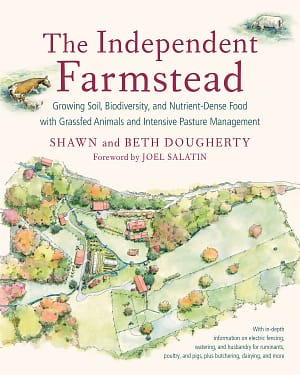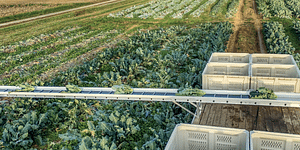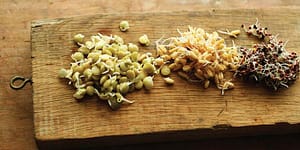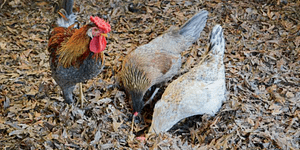Homesteading: Highlighting Our Need For Each Other

Homesteading isn’t meant to be a solitary adventure, done in isolation. Building and living on your land takes at least one partner, if not several. That’s why homesteaders have come to rely not just on their specialized skills, but on the skills of their neighbors, family, friends, and other homesteaders as well. It doesn’t make sense to only have one egg-producing chicken on a farm, so why would you try to run a farm with just one farmer?
The following excerpt is from The Independent Farmstead by Beth Dougherty & Shawn Dougherty. It has been adapted for the web.
Focusing our attention on pasture plants, animals, insects, we find ourselves drawn into their community, intimately concerned with their welfare. Building soil creates physical ties between us and the earth. If commitment, necessity, obligation are things you would rather avoid, you’re not going to like farming.
Neither is this a good life for the determinedly solitary. Building and living on the independent farmstead is not to be undertaken alone; here, if anywhere, we need a partner—at least one or, better, several. A single person will want to seek like-minded companions who share her peculiar fixation with plants, animals, soil, and food. Couples need the buy-in of family members, not just as passive, if willing, observers but as companions and substitutes, as a second set of hands, and someone to take over a milking when the flu sends us to bed. The quickest death we can imagine to a milking career is to try doing it alone. Dairying is not the occupation for a loner.
And this someone can’t be lukewarm on the farming life, dragged along by our enthusiasm but all the time with one eye on the clock, calculating how soon the job will be over. We can think of nothing that palls sooner than expecting help from someone who hates being asked. We both wanted this life, even before we knew what we were wishing for; our children, who have grown up on the farm, love it, even when there is a chore they’d just as soon avoid. Farming chores—especially chores related to dairying—are as regular as sunup and sundown, and more inevitable than any demands of human relationship. Undertaking them with someone who shares our sense of their beauty and function can create intimacy and cohesion, but forcing cooperation on the unwilling would soon undermine even the strongest determination.

Image from The Independent Farmstead
Our children are integral to the daily working of the homestead. Our belief in the value, even imperative value, of small-scale, low-impact household sustainability, and in the beauty and utility of natural food production, means that teaching our children to husband the land—or say, rather, learning to farm alongside them and sharing the lessons the land teaches us—are, to us, imperatives. In this country where we are encouraged to think that everything is possible for us if we just want it badly enough, we have had to conclude that our lives, at least, don’t contain the kind of time and resources it would take to make good on that promise.
Building a childhood in which are packed all the exposures, lessons, team experiences, and tutorials that might really make it possible for a person to follow any life course he thought desirable would cost a packet of money; we think, too, that it would not leave much room for childhood. We couldn’t afford to make it happen; we don’t like the idea in any case. But we don’t see our lives, or theirs, as being impoverished by the limitations imposed by real life; we believe enough in what we are doing that we are satisfied to spend time with our family in work, and meals, and play, passing on what we know, working out problems together, testing the value of our assumptions according to the corrections those assumptions are often dealt when reality flinches.
Failure
Nature is a complicated being, and setting out to work with her is an ongoing exercise in humility, because we can’t fully comprehend her, we can only pay attention and hope to swim with the current. If we succeed, for a moment, in inflicting our will upon her, it is only for a moment; the inevitable results of our violence will soon restore the balance. But Nature’s is a good balance, the only balance, in fact—all other pressures, of waste and consumption and manipulation and poison, being just flutters against the universal equilibrium.
We keep farming because, despite an inescapable sense of our own lack of information, we are even more strongly certain that the natural world makes sense, that it tends to fullness and fruition, that order is more powerful than disorder, and that death is only one manifestation of vibrant and vigorous life. Chickens should scratch in the dust, and eat bugs, and lay eggs, and so they do; pigs love swill and mud and lying in the shade, and these things make them healthy and good natured. Milk is for drinking and for cheese, it isn’t a well of lurking putridity only kept at bay by ultra-pasteurization and near-freezing temperatures. Hard work satisfies, and problems give us some mental exercise; being right is only temporary, and being wrong just means trying again.
Theodore Roosevelt once said, “In any moment of decision, the best thing you can do is the right thing, the next best thing is the wrong thing, and the worst thing you can do is nothing.” As children in the classroom we used to be afraid, when the teacher called upon us, that we wouldn’t have the right answer. Now, as farmers, we know we don’t have it, but we no longer have the option of doing nothing, and right or wrong, we have to make choices. So—we don’t know yet how to farm “the right way,” we may never know, but there is an order in the natural world that, so long as we move forward, tends to nudge us in the right direction. We are going to fail, not once, but many times; believing in the rationality of Nature even more than we believe in our failures gives us the confidence to keep farming anyway.
Independence, Interdependence
Homesteading highlights our need for one another in different ways. Never in our lives before we committed ourselves to grass-based food production had we conceived of or experienced the dependence all living things have—consciously or unconsciously—on one another, and on circumstances and events completely beyond our control.
Take the weather as an instance. One of the abiding shifts we have experienced as farmers is our attitude toward meteorological patterns. Rainy spell and dry, heat wave and cold snap, are no longer things we observe from an easy chair in a climate-controlled house, or which inconvenience us for the few moments between front door and driver’s seat; we’re out in them, and not only in them, but intimately affected by them. When it rains, we get wet; the cows have to be moved to a new paddock regardless of precipitation. In hot weather we drink more water and wash more laundry, soaking our clothes with sweat but getting the chores done regardless. Long dry spells may keep us awake at night, wondering how long the forage is going to hold out, and if the weather will break in time for the cool-season grasses to make some growth before winter sets in; prolonged rain means we have to be more aware of impact as we drive the lactating cows across the pasture and up to the barn for milking. We marvel at the change in our own concerns and thought patterns as a result of our partnership with this ecology; we marvel, and are grateful. Our lives are immeasurably richer by it.

Image from The Independent Farmstead
The behavior of animals is really important to us. A calf with ringworm in February will dominate dinner conversation until the bare places start to fill in again; if one of the sheep is snorting a good deal, we’ll start watching for signs of bot flies. A rooster who does his job too aggressively is bound for the soup pot, and a duck with a swollen foot will have us applying massage and poultices. And not only domestic animals, but wild, mammal, bird, insect, mollusk: the howl of coyotes in our home valley means a loaded shotgun where we can grab it quickly at night; the dry scream of a hawk reminds us to keep young poultry in a tractor or creep until they are too large to be carried off. The life cycle of locusts has a lot to do with whether we plant new orchard trees this year, or put it off until next, and the depredations of slugs in the lettuce beds can even induce us to dedicate a bottle of beer as slug bait in the garden.
And our friends, our community, are more important in the daily business of our lives than we have ever experienced them to be before. The example, aid, and comradeship of other grass-based farmers in the Eastern Ohio Grazing Council, and at events like the North Central Ohio Dairy Grazing Conference and Ohio Ecological Food and Farm Association Conference, have demonstrated our dependence on the help, advice, and friendship of other people. Butchering four hogs in a weekend, we are glad for all the people who show up to share the labor, time-honored jokes, good food. An overnight trip, illness, or injury, for the owner of dairy animals, requires finding someone who can milk, will milk, and is available to milk in our stead. Farmers need friends; those tough frontiersmen who did it all themselves probably died young.
We find that, through our farming, we are more closely related to our community in other ways. Putting more time into farming and less into cash-producing activities means a lower-volume domestic cash flow, but it doesn’t mean we are less able to help disadvantaged friends and neighbors. And it doesn’t prevent our supporting local charities; it just broadens the forms of our contributions. We feel even more blessed to be able to raise a hog for the freezer of a local widow with young children than when writing a check for foreign aid; raising food for the monastery includes us, in a small way, in their many spiritual and charitable works for the local community. Less time for organized community activities in town is balanced by time with people who come to the farm to spend a day in the country, learn something about where their food comes from, or volunteer time for heavy jobs at the monastery. Groups of university students come for a few hours, or days, to enjoy family time, nature time, time for physical labor. Farming, we find, increases, rather than decreases, our involvement with the people around us.
Recommended Reads
Recent Articles
Oxeye daisies are one of the most important plants for pollinators including beetles, ants, and moths that use oxeye daisies as a source of pollen and nectar. Instead of thinking about removing a plant like oxeye daisy, consider how you can improve the fertility and diversity of habitat resources in your home landscape, garden, or…
Read MoreSo you want to start reaping your harvest, but you’re not sure where to start? Learn how to break down the options of harvesting tools!
Read MoreWhat’s so great about oyster mushrooms? First, you can add them to the list of foods that can be grown indoors! They are tasty, easy to grow, multiply fast, and they love a variety of substrates, making oyster mushrooms the premium choice. The following is an excerpt from Fresh Food from Small Spaces by R. J.…
Read MoreEver heard the phrase, “always follow your nose?” As it turns out, this is a good rule of thumb when it comes to chicken manure. Composting chicken manure in deep litter helps build better chicken health, reduce labor, and retain most of the nutrients for your garden. The following is an excerpt from The Small-Scale Poultry…
Read More








